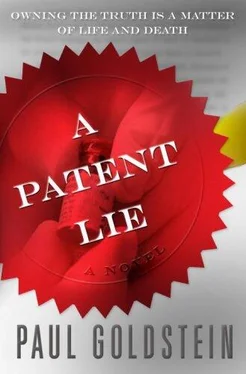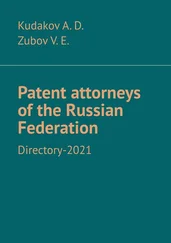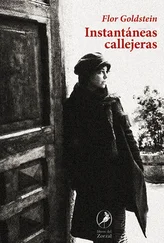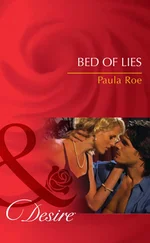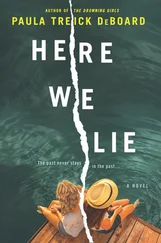Paul Goldstein - A Patent Lie
Здесь есть возможность читать онлайн «Paul Goldstein - A Patent Lie» весь текст электронной книги совершенно бесплатно (целиком полную версию без сокращений). В некоторых случаях можно слушать аудио, скачать через торрент в формате fb2 и присутствует краткое содержание. Жанр: Криминальный детектив, на английском языке. Описание произведения, (предисловие) а так же отзывы посетителей доступны на портале библиотеки ЛибКат.
- Название:A Patent Lie
- Автор:
- Жанр:
- Год:неизвестен
- ISBN:нет данных
- Рейтинг книги:3 / 5. Голосов: 1
-
Избранное:Добавить в избранное
- Отзывы:
-
Ваша оценка:
- 60
- 1
- 2
- 3
- 4
- 5
A Patent Lie: краткое содержание, описание и аннотация
Предлагаем к чтению аннотацию, описание, краткое содержание или предисловие (зависит от того, что написал сам автор книги «A Patent Lie»). Если вы не нашли необходимую информацию о книге — напишите в комментариях, мы постараемся отыскать её.
A Patent Lie — читать онлайн бесплатно полную книгу (весь текст) целиком
Ниже представлен текст книги, разбитый по страницам. Система сохранения места последней прочитанной страницы, позволяет с удобством читать онлайн бесплатно книгу «A Patent Lie», без необходимости каждый раз заново искать на чём Вы остановились. Поставьте закладку, и сможете в любой момент перейти на страницу, на которой закончили чтение.
Интервал:
Закладка:
Weed leaned forward to emphasize a point, exposing a snowfall of dandruff and a few wisps of hair across the shoulders of the dark tweed. At that moment a fact struck Seeley that, had he not been so absorbed by his dislike for the man, he would have seen at once: Weed knew about the collusion. The moment Thorpe told Weed that he was not going to testify on validity, this man who had in his career been through hundreds of patent trials, both as a litigator and as an expert, knew that the case was rigged. It probably wasn't his first such trumped-up case. He and Thorpe had probably laughed about it over cocktails the night before. The old bastard knew, and Seeley was his sport.
Seeley was done. “No more questions, Judge.”
“Mr. Thorpe, redirect?”
Thorpe's questions on redirect moved quickly, and Seeley watched the practiced rhythm of two lawyers who instinctively knew each other's moves. When Weed was Seeley's expert, they had never worked like that. One by one, Thorpe took Weed through the three other patents that Weed had analyzed in his opinion in addition to AV/AS.
Why was Thorpe doing this? By having Weed give his opinion on the validity of these other patents, Thorpe seemed to be inviting Seeley to ask the witness about his opinion on the validity of AV/AS itself. Without waiting for the judge, Thorpe turned to plaintiff's table and, with a look that told Seeley nothing, said, “Recross, Counselor?”
Like Thorpe, Seeley marched Weed through his conclusions on the validity of the three other patents, working to establish the same rhythm his adversary had, asking himself all the time how to wedge in the same question about AV/AS. He saw no way other than forward. Drawing in a quick breath, but not losing the rhythm, he said, “Mr. Weed, did you render an opinion on the validity of the AV/AS patent?”
“Yes, I did.”
Seeley knew he did. Weed's opinion had been that Vaxtek's patent was invalid. Seeley blocked out any awareness of movement at the defense table and stayed with the tempo he had established, as if by will alone he could drive past any objection from Thorpe and any consequence for abandoning the pretense that he was defending the AV/AS patent, not attacking it.
“And would you tell the jury what that opinion was?”
There was a beat in time, but no reply. Then another missed beat. In front of him, high on the ridge of Weed's cheekbones the scattering of small burst capillaries-was he a drinker, Seeley wondered, or just a cold-weather duck hunter? — grew redder. For the first time, a light went on in the witness's narrow eyes, a twinkle that only Seeley would see. At that moment, Seeley realized the catastrophic scale of his error. The two of them, Thorpe and Weed, had set him up. With one stupid mistake, he had undone all of his cautious footwork of the last three days and won the case for Vaxtek and St. Gall.
“Well,” Weed said, “in my written opinion, which has been made an exhibit, I concluded that the AV/AS patent was not valid, but-”
“Thank you, Mr. Weed, I have no more-”
Thorpe was on his feet. “Let the witness finish!”
Judge Farnsworth shifted forward in her chair. “Is that an objection, Mr. Thorpe?”
“Yes, Your Honor, it is. The witness has a right to finish his answer.”
Farnsworth at once saw what was happening. The trial was rolling to the conclusion the parties had planned, and there was nothing legally she could do to stop it.
“Sustained. Mr. Weed?”
Weed leaned back in the witness chair and tented his slender fingers in front of him. “As I was saying, I wrote in my opinion that the patent was invalid, but I will confess to you, Mr. Seeley-I'm under oath here-that I have written hundreds of validity opinions in my career, but I have never been more ambivalent about one of my opinions than I was about this one. Some mornings, before finally writing my opinion, I'd wake up and think, That patent's valid. The next morning, though, I'd be of a different mind.” Condescension seeped from him like a toxin. “And it was the same even after I wrote the opinion and sent it off to my client: some days valid, other days not.”
Seeley rapidly scanned the jury as he returned to counsel's table. Even the dullest of them understood what had just happened. A defense witness had admitted the possibility that Vaxtek's patent was valid, an admission that, however equivocal, would weigh as heavily as all of the opinions of Vaxtek's hired experts together. The kid slunk down in his chair, and fingered his ponytail; his expression-was it a smirk? a scowl? — was indecipherable.
Barnum's large hand clasped the sore shoulder, and Seeley felt the moisture of the man leaning into him. “Talk about a wild ride,” he said. “I don't know how you pulled that off.”
How could Seeley have forgotten that, from Barnum's perspective, Weed's concession that the AV/AS patent might be valid was a triumph.
“You took ten years off my life, asking him what he thought about the patent. How did you know he changed his mind?”
“Second sight. A trial lawyer's instinct.” Which was precisely what had failed him: the instinct to skirt a trial's black holes. You never ask a witness a question when you're not certain of the answer, and the fact that Weed's deposition gave one answer was no assurance that, at trial, he would not give another.
On the bench, Farnsworth appeared unconcerned about what had just happened and sorted through the stack of papers in front of her. “I'm hearing motions on my criminal docket this afternoon.” She set down the papers. “Counsel can make their closing arguments tomorrow morning and then I'll instruct our jury. You can obtain the jury instructions from my clerk. If you have changes to propose, I'll hear them first thing tomorrow morning.” She straightened the papers and started to rise. “Oh, yes. The clerk will tell you how much time you each have left.”
Seeley already knew. Palmieri, who had been busy at his laptop, searching for contradictions between Weed's testimony and his pretrial deposition, had also been counting time. He pushed a legal pad across the table to Seeley. At the top of the otherwise blank page he had written: “53 minutes.” Two years ago, drunk in a judge's chambers in New York City, Seeley had managed in less than a minute to come within a hair's breadth of being disbarred and destroying what was left of his career. Fifty-three minutes was more than enough time for him to finish hanging himself.
Seeley was in Pearsall's office working on the notes for his closing argument when the night operator buzzed that his brother was in the reception area. While he waited for Leonard, Seeley reflected on what had happened over the time that his brother had been gone. There was the confrontation with Renata after the football game. She had been flirting, yes, but only to see whether Seeley was the loyal, heroic brother that Leonard had endlessly praised to her. It seemed to Seeley that every other incident, from the discovery of his client's collusion to this morning's humiliation by Weed, also bore the imprint of Leonard's craven spirit. The thought for the first time occurred to him that, as consistently as he had been Leonard's protector, Leonard had all that time been his enemy.
Leonard wheeled his suitcase inside the office door. There were no arms poised for an embrace this time, but the salesman's smile was there.
“Great news, Mike. The FDA likes the data we're getting from the phase-three trials.”
“Congratulations. If the jury votes for your patent, you and St. Gall get to divide the world between you.”
The smile disappeared, but not because Leonard had been listening. He came closer to study Seeley's face as a physician would, taking hold of his shoulders and turning him into the light. “What happened to you?”
Читать дальшеИнтервал:
Закладка:
Похожие книги на «A Patent Lie»
Представляем Вашему вниманию похожие книги на «A Patent Lie» списком для выбора. Мы отобрали схожую по названию и смыслу литературу в надежде предоставить читателям больше вариантов отыскать новые, интересные, ещё непрочитанные произведения.
Обсуждение, отзывы о книге «A Patent Lie» и просто собственные мнения читателей. Оставьте ваши комментарии, напишите, что Вы думаете о произведении, его смысле или главных героях. Укажите что конкретно понравилось, а что нет, и почему Вы так считаете.
